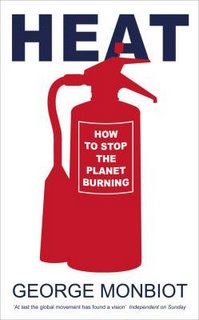 I have been thinking of starting this blog about Food Urbanism for some time. Apart from my usual procrastination, I couldn't figure out how to begin - the blank page has always intimidated me. Sitting in the departure lounge of Terminal 4 of Heathrow Airport in London, I realised that I must begin with global warming, or more accurately with a few comments about George Monbiot’s excellent new book Heat: How to Stop the Planet Burning.
I have been thinking of starting this blog about Food Urbanism for some time. Apart from my usual procrastination, I couldn't figure out how to begin - the blank page has always intimidated me. Sitting in the departure lounge of Terminal 4 of Heathrow Airport in London, I realised that I must begin with global warming, or more accurately with a few comments about George Monbiot’s excellent new book Heat: How to Stop the Planet Burning.There are few places on earth where the decadence of consumerism and the glamour of international air travel embrace each other so completely. I could not be described as a shopper, I avoid the retail experience as much as possible, but I am fascinated by this place where you can buy so many of the good things of life while waiting to jet off to exotic locations. While I have generally failed as a consumer, I have been a frequent flier for significant periods of my life, traveling through Europe, Africa and Asia as a kid, and numerous trips over the past 15 years between my family home near Toronto, Canada and my adoptive home in Dublin, Ireland. A few years ago I stopped keeping track at well over 100 flights, many of them long-haul. This is enough to put me into the elite realm of serious environmental destructors. I am responsible for producing more greenhouse gases than all but the tiniest minority of the 6+ billion people with whom I share this stressed planet and its paper thin atmosphere.
When Monbiot's new book came out last month, I knew that I would read it sooner or later, but it was after a friend recommended it so enthusiastically that I picked it up to read on my flight to Vancouver. The purpose of my trip was to attend the Bridging Borders Toward Food Security Conference and to do some research into Vancouver examples of Urban Agriculture (more on that later). Thus I found myself waiting in Terminal 4, slightly shocked to find numerous copies of Heat prominently displayed as the latest non-fiction offering to the jet setting masses.

Reading Monbiot's description of the threats posed by global warming while cruising at 12000 metres is tough. When he makes the case that there are no options for reducing the damage caused by air travel except by massively restricting the number and length of flights, I felt so guilty that I was desperate to get off the plane. Imagine an habitual dieter gorging on a huge tub of decadent ice cream while being subjected to a continual stream of images of obese, unhealthy people. I think that this would be similar to my feelings of guilt, with a crucial difference. It is likely that I will suffer far less because of my carbon binge than many other people living in distant lands about whom I usually hear only tragic news - if I hear anything at all.
This book is heavy stuff. Monbiot does not pull any punches as he presents the devastating realities that we face. But it is far more important as an investigation into solutions. I agree with Monbiot about the likely severity of global warming and about the depth and urgency of the cuts we need to make to our CO2 emissions, but more importantly I share his belief that we can prevent the worst effects of global warming. He set himself the task of trying to figure out how we, those of us in rich/developed/industrialised nations, can reduce carbon dioxide emissions by 90% within 25 years. He expected to fail in this task, but after completing the book he feels that it is feasible. By feasible he means "compatible with industrial civilisation." Although I could argue the appropriateness or desirability of maintaining the dominant model of what constitutes 'the good life', I will let it pass for now, except to say that I believe that his most significant fault is a failure to conceive that another world is indeed possible.
In his introduction, Monbiot provides a very interesting view of our situation:
Fossil fuels helped us to fight wars of a horror never contemplated before, but they also reduced our need for war. For the first time in human history - indeed for the first time in biological history - there was a surplus of available energy. We could survive without having to fight someone for the resources we needed. Our freedoms, our comforts, our prosperity are all the products of fossil carbon, whose combustion creates the gas carbon dioxide, which is primarily responsible for global warming. Ours are the most fortunate generations that have ever lived. Ours might also be the most fortunate generations that ever will. We inhabit the brief historical interlude between ecological constraint and ecological catastrophe.(my emphasis)
I believe that this ecological catastrophe of global warming can be prevented without reverting to a situation where ecological constraints forces everyone to fight over dwindling resources. I believe that we can do this and still have our freedoms, our comforts and our prosperity - but we will have to readjust our interpretation of what constitutes freedom, comfort and prosperity.
This is where food comes in. Our food supply systems are heavily dependent on fossil fuels at all stages in the process of getting food from the farm (or more accurately the factory) to our tables. Taken as a whole, our food supply system is one of the greatest generators of greenhouse gases, but those involved in trying to prevent global warming seem largely unaware of this fact - Monbiot included. All it takes is a quick scan through the index of his book to note the absence of anything food related, let alone any details of how systemic changes in the way that our food is produced can significantly reduce the warming of our planet. He discusses possible energy, transport and housing strategies at length, but hardly mentions how we might change the way that we feed ourselves. I have found this to be typical of much of the climate change debate, and it strikes me as both a significant lack of awareness of the issues and a missed opportunity.
There are many reasons why we would want to change the way our food is grown, processed, transported, sold, consumed and discarded, but the threat of global warming provides the ecological imperative to radically transform our food systems. I believe that one of the most effective way of reducing our greenhouse gas emissions is to change how food is produced, to change what we eat and when, to change our relationships with those who grow, process and sell it, and, most importantly, to change the location of our food production. In fact, I am convinced that we will not be able to prevent the ecological catastrophe which Monbiot so clearly describes, without reintegrating human habitation, economy, politics, society and culture with food production.
This is the basis, and primary motivation, for this blog.